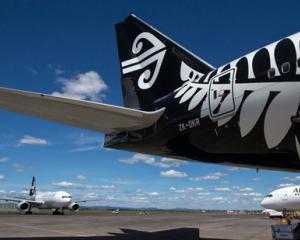The dynamics of the airline industry regularly change as competitors search for profits, thus affecting services and airports.
In few places has this been more evident than in Dunedin.
Airlines have come and gone - Kiwi Air, Freedom Air, Ansett New Zealand, Qantas New Zealand - and flight numbers domestically and to Australia have taken off and subsided.
At one stage there were three year-round flights to Sydney and Brisbane and summer services to Melbourne, and for a while even winter trips to Coolangatta.
The "international" in Dunedin International Airport's official name really stood for something.
Last year, though, transtasman flight numbers reached a miserable nadir, with nothing scheduled for four months of the year.
The advent of Pacific Blue domestically in 2008 - and internationally later last year - established year-round connections to Brisbane, and Air New Zealand earlier this year approved another summer's flying to Sydney and Melbourne.
Pacific Blue's advent has provided desperately needed competition on both fronts, yet this week has come more potential change with the announcement of planned transtasman code and revenue sharing between Air New Zealand and Virgin Blue, Pacific Blue's owners.
This brings both promises and threats.
Air New Zealand's chief executive, Rob Fyfe, was quick this week to allay fears of reduced Dunedin services.
Because further alienation of Southern travellers is not in the airline's interests and because of assurances when its lower-cost subsidiary, Freedom Air, was grounded, many will treat his remarks with scepticism.
The advantages of Dunedin being part of mainstream Air New Zealand were trumpeted at that time.
Australian travel agents would, for example, have readier access to the Dunedin connection, Air New Zealand said.
What happened, though, was that services were gradually run down and the trek of Southern travellers through Christchurch intensified.
In hindsight, not that the company would ever admit it, Air New Zealand bungled.
Jetstar, owned by Qantas, flew into the bulk low-cost vacuum and has been steadily increasing its share of the market.
Air New Zealand's attempt to boost yields through providing better service at higher prices failed because the vast majority of passengers chose on price; a few hours in the equivalent of a flying bus would do to cross "the ditch".
Air New Zealand's website this week illustrates how its strategy has evolved and how much it is moving back into the low-cost, low-service model.
Special offers from Christchurch to Sydney have tiered options: "seat", "seat plus bag", "the works", and "works deluxe".
Mr Fyfe argues that what he calls marginal transtasman services, like those from Dunedin, can be boosted by the combined Virgin Blue and Air New Zealand network and marketing power.
Whereas one airline might struggle to support a service, the two together may be sufficient.
If he is correct and if the airlines are willing to keep prices close to those out of Christchurch and Auckland then regular year-round flights to Sydney and Melbourne from Momona could well be successful.
Because car, bus and planeloads of Dunedin people trek north every week to fly to onward destinations the numbers are there if the airlines are willing.
One suspects that if Air New Zealand was able to capture a reasonable portion of the traffic to Christchurch on internal flights, and then a large percentage for international, it would be content to let Dunedin wither as before.
But because of Jetstar's vigour, and with Emirates flying to Sydney, Air New Zealand - and for that matter Pacific Blue as well - could increasingly miss out.
The airlines should, therefore, have the incentive to try to snare transtasman passengers from Dunedin rather than encouraging them north into someone else's clutches.
Also in Dunedin's favour is the threat that Jetstar might be waiting in the wings to fly from Dunedin itself, internationally or domestically.
While the Air New Zealand and Virgin Blue deal, widely expected later this year to receive regulatory approval, is strictly on transtasman flights, one niggle concerns domestic arrangements.
How much incentive will Virgin Blue have to maintain and build its New Zealand Pacific Blue services? Might there be a subtle downgrading in domestic competition out of Dunedin? There is no doubt competition sharpens pencils.
Additional Christchurch to Sydney rivalry from Emirates means deals on that leg are often better than Christchurch to Melbourne.
Given the topsy-turvy history of airline services from Dunedin, only a brave or foolish person would confidently predict the outcome of this week's proposed alliance.
But for the sake of Dunedin and the people of the South, it must be hoped that any lessening of competition is more than compensated for by an aggregation of passenger numbers to a level adequate enough to support year-round flights to Sydney and Melbourne.
It also must be hoped that the latest turbulence in this unstable industry works to Dunedin's advantage.




